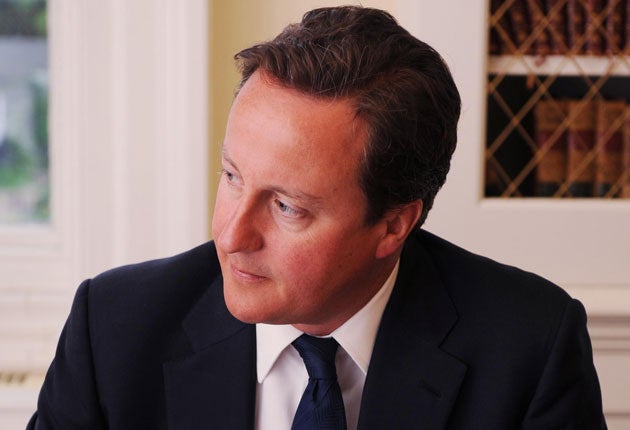Your support helps us to tell the story
From reproductive rights to climate change to Big Tech, The Independent is on the ground when the story is developing. Whether it's investigating the financials of Elon Musk's pro-Trump PAC or producing our latest documentary, 'The A Word', which shines a light on the American women fighting for reproductive rights, we know how important it is to parse out the facts from the messaging.
At such a critical moment in US history, we need reporters on the ground. Your donation allows us to keep sending journalists to speak to both sides of the story.
The Independent is trusted by Americans across the entire political spectrum. And unlike many other quality news outlets, we choose not to lock Americans out of our reporting and analysis with paywalls. We believe quality journalism should be available to everyone, paid for by those who can afford it.
Your support makes all the difference.The head of the Royal Navy has been summoned to 10 Downing Street to be hauled over the coals by David Cameron after raising doubts about the armed forces' ability to sustain a lengthy campaign in Libya.
Admiral Sir Mark Stanhope sparked the Prime Minister's anger yesterday by suggesting that the Government would have to make "challenging decisions" on force levels if the mission lasted more than six months.
Mr Cameron told MPs today that he had spoken to Admiral Stanhope, and that the First Sea Lord now "agreed that we can sustain this mission as long as we need to". He said it was vital that the UK sent out a consistent message that "time is on our side".
A senior Whitehall source confirmed that the Navy chief was called in to explain his remarks and made clear he was given a dressing-down.
"I think you can assume that there was no coffee or biscuits," said the source.
Speaking at Prime Minister's Questions in the House of Commons, Mr Cameron told MPs: "I had a meeting with the First Sea Lord yesterday and he agreed that we can sustain this mission as long as we need to. That is exactly the words used by the Chief of Defence Staff yesterday."
And he added: "We are doing the right thing and I want one simple message to go out from every part of this Government, and indeed every part of this House of Commons, and that is that time is on our side.
"We have got Nato, we have got the United Nations, we have got the Arab League, we have right on our side. The pressure is building, militarily, diplomatically and politically and time is running out for Gaddafi."
Mr Cameron's comments came ahead of talks today with Nato secretary general Anders Fogh Rasmussen, who will also discuss the situation in Libya with Foreign Secretary William Hague.
Following the row triggered by his comments, Admiral Stanhope wrote an article for today's Sun newspaper, praising the work of "your modern, flexible Navy" and pointing out that it is to receive two new aircraft carriers as well as Type 45 destroyers, submarines, combat ships, tankers and support ships.
Admiral Stanhope told journalists on Monday that the UK was "comfortable" with the present Nato mission, which was extended earlier this month by 90 days, to the end of September.
But he added: "Beyond that, we might have to request the Government to make some challenging decisions about priorities. If we do it longer than six months we will have to reprioritise forces."
In response, the head of the Armed Forces, Chief of Defence Staff General Sir David Richards, insisted that Britain can sustain its intervention in Libya for "as long as we choose to".
Unconfirmed reports in the Daily Mirror suggested that Gen Richards warned the Prime Minister ahead of the outbreak of allied military action on March 19 that air strikes alone would not be enough to topple dictator Muammar Gaddafi.
And the paper quoted a Whitehall source as saying: "The likelihood of stalemate was flagged from the start."
Meanwhile, South African President Jacob Zuma - who visited Libya last month in an unsuccessful attempt to broker a peace deal - made his most outspoken attack yet on Nato's "misuse" of UN Security Council Resolution 1973, which permits military action to protect civilians.
Mr Zuma told South Africa's parliament: "We strongly believe that the resolution is being abused for regime change, political assassinations and foreign military occupation."
Last night, Nato warplanes struck targets in the Libyan capital, Tripoli, while allied aircraft also dropped leaflets warning Gaddafi's forces to abandon their posts in Zlitan, near the rebel-held city of Misrata.
The leaflets, bearing a Nato symbol and a picture of a British Army Apache attack helicopter and burning tanks, carried the message in Arabic: "There's no place to hide. It's not too late to stop fighting. If you continue to threaten civilians, you will face destruction."
Subscribe to Independent Premium to bookmark this article
Want to bookmark your favourite articles and stories to read or reference later? Start your Independent Premium subscription today.

Join our commenting forum
Join thought-provoking conversations, follow other Independent readers and see their replies
Comments